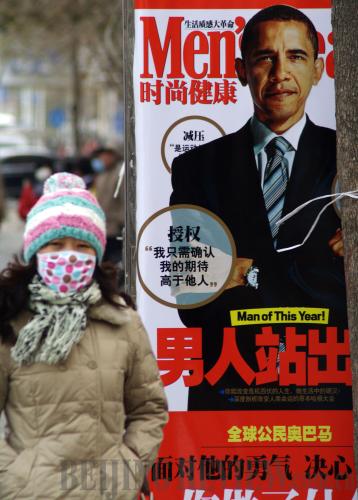|
 |
|
YES HE DID: U.S. President Barack Obama appears on the cover of November's edition of a Chinese men's fashion magazine (CFP) |
Nevertheless, the Chinese model and its implications have become a hot topic overseas. In the long term, the Chinese model will greatly dampen Western confidence, and thus bring its complex influence to Sino-U.S. relations.
Reasons for optimism
Since Obama took office, Sino-U.S. relations have successfully avoided the usual fluctuations associated with power transitions in the United States.
Before Obama took power, for one thing, China had made active efforts to establish contacts with his decision-making team. After he assumed office, top officials of both sides held frequent meetings. This was a signal of good, even brilliant, bilateral relations.
After the 2008 Beijing Olympic Games, the achievements of China's reform and opening up became increasingly known to the rest of the world. Its overall national strength, moreover, has kept growing at a steady pace.
Since the reform and opening up began in 1978, China has pursued a foreign policy of keeping a low profile and seeking cooperation. Growth of national strength will not change the peaceful nature of China's foreign policy.
China's commitment to peaceful development and its proposal of a "harmonious world," in other words, further clarify the principles of peace and cooperation in Chinese diplomacy. This increases the cooperativeness of the U.S. strategy toward China and makes it better able to accept the country.
The emergence of the financial crisis caused overwhelming damage to the lead position of the United States in the world economy. Thus, any recovery of the American economy will rely heavily on the rapid growth of Chinese economy and the active cooperation of China.
Meanwhile, Beijing's effective measures in the crisis have won U.S. respect.
Indeed, since taking office, Obama has utilized "smart power"—emphasizing a comprehensive mix of hard power and soft power diplomacy—to serve American interests.
| 